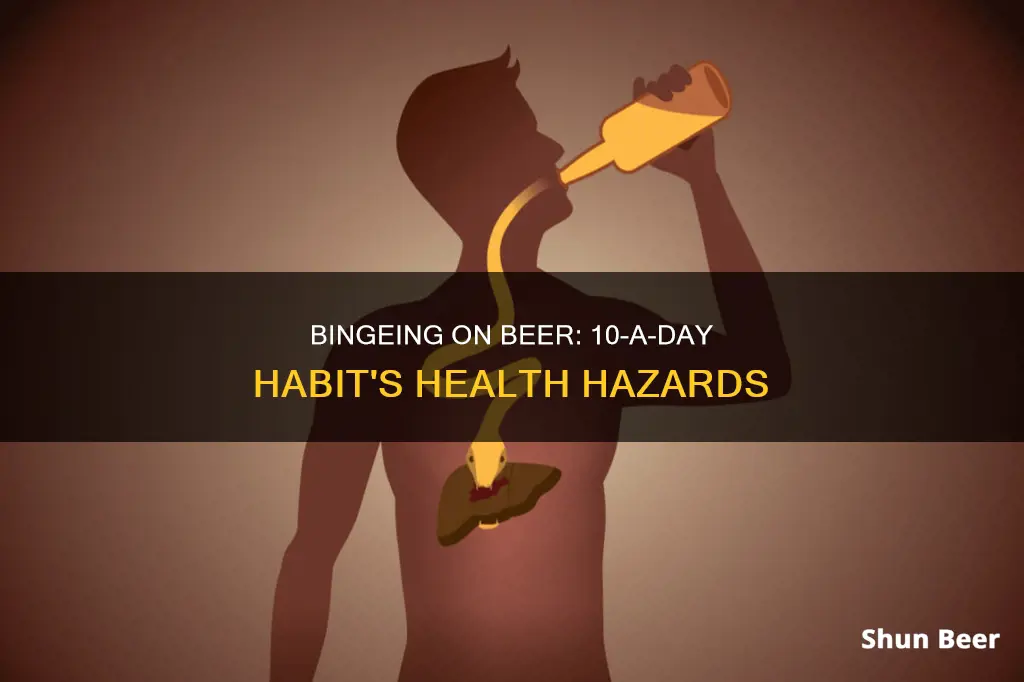
Drinking 10 beers a day can have serious negative impacts on your health and longevity. Excessive beer consumption can lead to liver damage, an increased risk of chronic diseases, and nutritional deficiencies. It can also impair cognitive function, increase the risk of mental health issues, and have negative social consequences. Additionally, drinking 10 beers a day can affect your sleep, slow down your weight loss, and cause digestive issues, dehydration, and chronic diseases. The financial and legal consequences of excessive drinking can also be significant, with the cost of purchasing 10 beers a day quickly adding up and an increased risk of engaging in risky behaviours.
What You'll Learn

Nutritional deficiencies
Drinking 10 beers a day can lead to nutritional deficiencies, causing a range of adverse health effects. Beer contains calories but lacks essential vitamins and minerals, which can result in inadequate intake of vital nutrients for maintaining overall health.
Excessive beer consumption can lead to vitamin B12 deficiency, which is necessary for proper nerve and blood cell functioning, as well as the production of DNA. Vitamin B12 deficiency can cause fatigue, weakness, nerve problems, and even cognitive issues.
Magnesium deficiency is another concern, as magnesium is crucial for muscle and nerve function, blood sugar control, and blood pressure regulation. A lack of magnesium can contribute to muscle cramps, fatigue, irregular heartbeats, and osteoporosis.
Drinking 10 beers a day can also interfere with the absorption and utilisation of other nutrients. For example, alcohol can inhibit the absorption of thiamine (vitamin B1), which is essential for energy production and nerve health. A deficiency in thiamine can lead to beriberi, a disease characterised by nerve damage, mental confusion, and heart problems.
Additionally, excessive alcohol intake can lead to malnutrition and weight gain. Alcoholic beverages are often calorie-dense, providing little nutritional value. This can result in weight gain and obesity, increasing the risk of cardiovascular disease, type 2 diabetes, and other health issues.
Furthermore, alcohol can negatively impact the gut microbiome, impairing the absorption of nutrients and contributing to digestive problems. Alcohol can also increase inflammation in the body, affecting the gut lining and disrupting the balance of beneficial bacteria in the intestines.
To summarise, drinking 10 beers a day can lead to nutritional deficiencies by displacing essential nutrients in the diet, inhibiting their absorption, and contributing to weight gain and digestive issues. These deficiencies can have wide-ranging impacts on overall health and well-being.
Beer in Mexico: Safe to Drink?
You may want to see also

Strained relationships
Drinking 10 beers a day can have detrimental effects on your relationships with family, friends, and romantic partners. Alcohol abuse can lead to strained relationships due to behavioural changes, mood swings, impaired judgement, and conflicts. Here are some ways in which consuming 10 beers a day can negatively impact your relationships:
- Behavioural Changes and Mood Swings: Heavy drinking can lead to aggression, irritability, and mood swings. These behavioural changes can make it difficult to maintain healthy relationships and may push loved ones away.
- Impaired Judgement: Alcohol affects decision-making abilities and can lead to poor choices, which can damage relationships. This includes decisions such as drunk driving, engaging in illegal activities, or neglecting responsibilities.
- Conflicts and Isolation: Excessive drinking can lead to conflicts and disputes with family, friends, and partners. It can also result in prioritising drinking over social activities, leading to isolation and a decline in social well-being.
- Emotional and Psychological Challenges: Alcohol abuse can contribute to emotional and psychological issues, which can further strain relationships. This includes conditions such as depression and anxiety, which may lead to difficulties in connecting with others.
- Negative Impact on Social Interactions: Drinking 10 beers a day can negatively impact your social life. It can lead to a decline in social well-being, as you may isolate yourself or find it challenging to connect with others.
- Prioritisation of Drinking: When drinking becomes a priority, it can affect your availability and willingness to engage in social activities. This can create a distance between you and your loved ones, damaging your relationships.
It is important to recognise that alcohol abuse can have severe consequences on your relationships and overall well-being. Seeking support and making positive changes to your drinking habits are crucial steps towards improving your relationships and quality of life.
Beer and Clindamycin: Is It Safe?
You may want to see also

Increased risk of chronic diseases
Drinking 10 beers a day can have serious negative impacts on your health and longevity. Regularly consuming such a high volume of beer is linked to an increased risk of chronic conditions. Here are some of the risks associated with this level of beer consumption:
Drinking 10 beers a day is linked to an increased risk of developing chronic diseases. Alcohol abuse is associated with a range of health conditions, including:
- Cardiovascular disease
- Certain types of cancer
- Liver disease
- High blood pressure
- Stroke
- Diabetes mellitus
- Obesity
The impact of drinking is usually dose-dependent, and light to moderate drinking tends to lower the risks of certain diseases, while heavy drinking tends to increase the risks. Other factors, such as drinking frequency, genetic susceptibility, smoking, diet, and hormone status, can also modify the association.
Heavy drinking has been implicated in a wide range of health problems. In addition to the average daily consumption, heavy episodic drinking (binge drinking) has also been identified as harmful. Binge drinking is defined as consuming at least 60 g of pure alcohol on one occasion.
According to the International Agency for Research on Cancer, ethanol in alcoholic beverages, as well as acetaldehyde associated with alcohol consumption, are classified as "human carcinogens". Alcohol consumption has been identified as carcinogenic in a variety of cancers, including those of the upper aerodigestive tract, liver, colorectum, and female breast. Heavy drinkers have higher risks of total cancer compared to nondrinkers and occasional drinkers.
Potential mechanisms for detrimental effects of drinking in chronic disease development
- Modulating sex hormone levels: Alcohol increases sex hormone levels, which may be involved in its carcinogenic effects. It stimulates adrenal androgen production, upregulates luteinizing hormone, induces aromatases, and impairs the metabolism of sex steroids in the liver.
- Promoting age-related biological processes: Alcohol abuse may promote biological processes associated with aging, resulting in the early onset of aging-related diseases, including cancer at multiple sites.
- Interfering with folate metabolism: Folate plays a key role in the synthesis of S-adenosylmethionine and nucleotide synthesis. Folate depletion can lead to alterations in DNA and RNA methylation, disruption of DNA integrity, and DNA repair, thereby promoting carcinogenesis. Heavy drinkers are often folate deficient due to reduced absorption in the intestinal tract.
- Promoting cancer cell invasion and metastasis: Epidemiological studies have shown that alcohol intake is associated with cancer invasion and metastasis, leading to poor prognosis. Alcohol may worsen cancer outcomes by stimulating epithelial-mesenchymal transition in cancers, enhancing the invasive ability of cancer cells, and increasing tumor angiogenesis and metastasis.
- Impaired glucose tolerance and insulin resistance: Heavy drinking has been linked to impaired glucose tolerance and insulin resistance, which can contribute to the development of diabetes. It can also lead to visceral adipose tissue accumulation, upregulation of inflammatory adipokines, and hypoxia indicators.
- Dysfunction of pancreatic β-cell: Chronic alcohol administration can induce dysfunction and apoptosis in pancreatic β-cells, partly through nitration and downregulation of glucokinase. It can also upregulate endoplasmic reticulum stress in the pancreas.
- Increased oxidative stress: Chronic alcohol consumption can lead to oxidative stress, which is a fundamental factor in the development of diabetic complications. It can also result in tissue remodeling and alcoholic cardiomyopathy.
Exploring Jordan's Beer Culture and Drinking Laws
You may want to see also

Impaired cognitive function
Drinking 10 beers a day can have a detrimental effect on cognitive function, impairing memory, concentration, and decision-making abilities. This can lead to a decline in work or academic performance and overall cognitive abilities.
Alcohol affects the brain by interfering with neurotransmitters, resulting in slower reaction times, decreased coordination, and impaired decision-making. This interference can have a significant impact on daily tasks and overall cognitive abilities.
The National Institute on Alcohol Abuse and Alcoholism states that alcohol can affect the brain's communication pathways and its ability to process information. Sleep quality is also impaired, even with light drinking, as the liver works to metabolise the alcohol, disrupting normal sleep patterns.
Additionally, heavy drinking is associated with an increased risk of mental health problems such as depression and anxiety. Alcohol can exacerbate pre-existing mental health conditions or contribute to the development of new ones. It is a depressant that can enhance feelings of sadness, anxiety, and stress, increasing the risk of developing conditions such as depression and anxiety disorders.
The effects of impaired cognitive function due to excessive alcohol consumption can be far-reaching, impacting various aspects of daily life, including work, school, relationships, and overall quality of life. Recognising the signs of alcohol abuse and seeking professional help are crucial steps towards improving overall health and well-being.
The Right Age to Drink Beer
You may want to see also

Sleep disruption
Drinking 10 beers a day can severely disrupt your sleep. While alcohol might help you fall asleep initially, it will negatively impact your sleep quality throughout the night.
Alcohol affects your sleep cycle by altering your sleep architecture. Typically, the sleep cycle begins with three non-rapid eye movement (NREM) stages of sleep, followed by rapid eye movement (REM) sleep. During sleep, the body cycles through all of these stages every 90 to 120 minutes, with NREM sleep dominating the first part of the night and REM sleep increasing in the second half of the night. Each stage serves a specific function and is necessary for sleep to be refreshing and restorative.
When you consume alcohol before bed, you are likely to experience more N3 sleep, also known as "deep sleep," and less REM sleep in the initial stages of sleep. However, later in the night, once your body has metabolized the alcohol, you will likely experience more N1 sleep, the lightest stage of sleep, leading to frequent awakenings and fragmented sleep. This disrupted sleep pattern can result in a vicious cycle, with insomnia being self-treated with alcohol, followed by caffeine consumption during the day to counteract excessive sleepiness.
Additionally, alcohol can aggravate snoring and sleep apnea, a disorder characterized by repeated pauses in breathing during sleep. Alcohol causes physiological changes, such as the relaxation of tongue and throat muscles and increased airway resistance in the nasal passages, which can significantly increase the likelihood and duration of breathing interruptions during sleep.
Furthermore, heavy alcohol use can contribute to the development of insomnia, with up to three-quarters of individuals with alcohol dependence experiencing insomnia symptoms. Insomnia is also prevalent in people undergoing withdrawal or early recovery from alcohol addiction, creating a destructive pattern where individuals use alcohol as a sleep aid but end up with poor sleep quality.
In summary, drinking 10 beers a day can severely disrupt your sleep patterns and quality. It alters your sleep architecture, interferes with sleep cycles, aggravates snoring and sleep apnea, and increases the risk of developing insomnia. These sleep disruptions can have a detrimental impact on your overall health, well-being, and daily functioning.
Beer Belly: How Much Drinking Leads to a Potbelly?
You may want to see also
Frequently asked questions
Drinking 10 beers a day can have serious negative consequences for your health and longevity. It is considered heavy drinking, which can lead to health issues such as unintentional injuries, violence, chronic diseases, memory and learning problems, mental health issues, and nutritional deficiencies.
The short-term effects of drinking 10 beers a day can include impaired cognitive function, such as slower reaction times, decreased coordination, and difficulty in decision-making. It can also lead to behavioural changes such as aggression and irritability.
The long-term effects of drinking 10 beers a day can include liver damage, increased risk of chronic diseases such as heart disease and certain types of cancer, and nutritional deficiencies. It can also contribute to the development of mental health issues such as depression and anxiety.
Excessive drinking can strain relationships and negatively impact social interactions. It may lead to conflicts, isolation, and a decline in overall quality of life.
If you are currently drinking 10 beers a day, it is important to set goals and gradually reduce your alcohol intake. Find alternative activities to fill the time, such as joining a club or spending more time with supportive friends and family. If you are struggling with addiction, seek professional help from a support group or therapy program.







